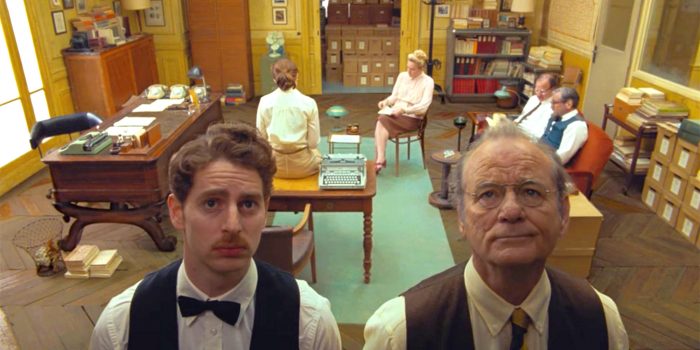Reviewed by Jeffrey Sanzel
Auteur Wes Anderson’s first feature film was Bottle Rocket (1996), based on a short he made in 1994 with Luke and Owen Wilson. His sophomore outing, Rushmore (1998), brought him to prominence. The quirky, line-crossing comedy follows a high school student (Jason Schwartzman) with a crush on a fifth-grade teacher (Olivia Williams).The film featured Bill Murray in the first of nine collaborations with the director.
With a focus on (and often delight in) the dysfunctional and a sense of heightened reality, Anderson’s works (for which he not only directed by served as writer and producer) have included The Royal Tenenbaums (2001), The Life Aquatic with Steve Zissou (2004), The Darjeeling Limited (2007), The Grand Budapest Hotel (2014), and The French Dispatch (2021).
His films have received fifteen Academy Award nominations (winning four, all for The Grand Budapest Hotel). In addition, the works have 20 BAFTA nominations (winning five) and 10 Golden Globes (winning two).
To discuss Anderson’s latest offering, Asteroid City, two terms are helpful. The first is “meta.” Definitions of “meta” vary slightly. The most accessible is Merriam-Webster’s informal explanation: “showing or suggesting an explicit awareness of itself or oneself as a member of its category; cleverly self-referential.” It goes on to cite various examples:
“The Bar?” she said. “I know the place. Been meaning to drop by. Love the name. Very meta.” — Gillian Flynn
A new comedy about fantasy football, which follows a group of armchair quarterbacks as they try to tackle life. How meta would it be if people started betting on what was going to happen on the show? — TV Guide
Leave it to Larry [David] to contort public desire for a Seinfeld reunion into a meta plot that chronicles his not-necessarily-noble struggle to pull off a Seinfeld reunion. —Dan Snierson
The second term is “shaggy dog story.”
Again, let us turn to Merriam-Webster: “of, relating to, or being a long-drawn-out circumstantial story concerning an inconsequential happening that impresses the teller as humorous or interesting but the hearer as boring and pointless.”
And therein explains the meta-comedy/shaggy dog story Asteroid City, one hundred and five minutes of tedious indulgence that evokes an occasional strained chuckle but otherwise ceaselessly plods to a non-conclusion.
A Rod Serling-like host (Bryan Cranston) introduces a television show following the creation of a play penned by world-famous writer Conrad Earp (Edward Norton). The black-and-white framing device evokes the earliest days of television. Earp’s play, Asteroid City (presented widescreen in vivid shades of sherbet), tells of the titular desert town hosting a youth astronomy convention. The action shifts between the presentation of the play and the television special. Some might complain that the documentary gimmick interferes with the narrative action. However, this is a minor cavil since the story plays in virtual stagnation.
Anderson creates a story where everything means something, even if it doesn’t. The 1955 world of the Cold War, atom bomb testing, a movie star, singing cowboys, a grieving widower, and a host of odd types and situations parade limply through the convoluted plot. Eventually, the assorted characters end up under government quarantine when an alien briefly appears, stealing a meteorite fragment.
There is enormous potential for commentary and outrageous, pointed humor between the two worlds- the theatrical and the narrative. However, Anderson misses on almost every count. Even his concept of a three-act play bears no sense of understanding, with its only true reference to the indication of scenes.
He has assembled an all-star cast (many veterans of his films), headed by Jason Schwartzman (as the widower) and Scarlett Johansson (as the movie star), supported by first-rate talents including Tom Hanks, Jeffrey Wright, Tilda Swinton, Adrien Brody, Liev Schreiber, Hope Davis, Matt Dillon, Steve Carell, Hong Chau, Willem Dafoe, and Margot Robbie.
Sadly, they all give the same performance—or rather, the idea of a performance of a performance. Everyone speaks in an identically flat cadence, lips barely parting like poorly skilled ventriloquists, mouthing pretentious dialogue, wanting—but failing—to be outrageously quippy or metaphorically deep. Rarely has so much talent gone for so little.
The only interest rests in the two-dimensional visuals, alternating between crisp black-and-white and hyper-rich colors, the work of cinematographer Robert Yeoman. A few whimsical pieces—vending machines that dispense martinis complete with lemon twists or others that offer valueless desert real estate—evoke a weary smile. But again, not enough to sustain the short but interminable running time.
Great art manifests best when the whole is greater than the sum of its parts. What happens when there is no center? When the whole is a hole? Several times, the lead actor complains, “I don’t understand the play.” The director’s response: “But just keep doing it.” Well, perhaps not.
Rated PG-13, the film is now playing in local theaters.






